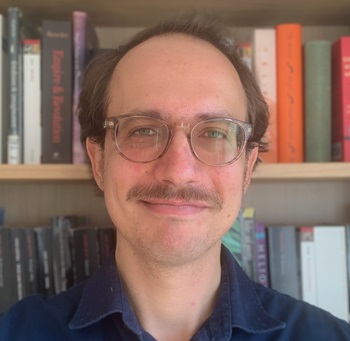Dr Ryan Heuser, CDH
rj416@cam.ac.uk

Biographical Information
Ryan is a literary historian and computational humanist with fifteen years of experience in researching and teaching in the digital humanities. His doctoral training is in eighteenth-century British literature; he completed his dissertation in 2019 in Stanford University’s English department. At Stanford, he was a founding member and Associate Research Director of the Stanford Literary Lab, where he led the computational development and experimental design of five of its publications. From 2019 to 2022, he was Junior Research Fellow in King’s College, Cambridge, where he supervised students in English literature and Practical Criticism within King’s College; taught a workshop in the Center for Digital Humanities (‘Automating the Bechdel Test: Computing Gender Bias across Media’); and helped to review and establish its MPhil program. He is now Assistant Professor of Digital Humanities in the Cambridge Digital Humanities program.
Research Interests
Ryan’s research and pedagogy span topics from the history and theory of DH to its methodological groundings in data science and visualization, natural language processing, network theory, machine learning, and large language models. His work focuses on computational approaches to prosody and rhythm, literary and intellectual history, and the history and impact of artificial intelligence on language. Some of his latest work on computational intellectual history appears in a new book from Cambridge University Press, Explorations in the Digital History of Ideas (2023, ed. Peter de Bolla).
Areas of Graduate Supervision
Eighteenth-century studies and digital humanities
Selected Publications
Peer-reviewed publications
- “Computing Koselleck: Modeling Semantic Revolutions, 1720-1960.” Explorations in the Digital History of Ideas. Ed. Pete de Bolla. Cambridge University Press. 2024.
- “Enlightenment Entanglements of Improvement and Growth.” Explorations in the Digital History of Ideas. Ed. Pete de Bolla. Cambridge University Press. 2024. (Co-authored with Peter de Bolla and Mark Algee-Hewitt).
- “Mapping London’s Emotions.” New Left Review 101 (2016): 63-91. (Co-authored with Franco Moretti and Erik Steiner).
- “Mapping the Emotions of London in Fiction, 1700-1900: A Crowdsourcing Experiment.” Literary Mapping in the Digital Age. Ed. David Cooper, Chris Donaldson, and Patricia Murrieta-Flores. Ashgate. 2016. (Co-authored with Mark Algee-Hewitt, Van Tran, Annalise Lockhart, and Erik Steiner).
- “Learning to Read Data: Bringing out the Humanistic in the Digital Humanities.” Victorian Studies 54.1 (2011): 79-86. (Co-authored with Long Le-Khac).
Stanford Literary Lab pamphlets
Reprinted in Canon/Archive: Studies in Quantitative Formalism from the Stanford Literary Lab, ed. Franco Moretti (New York: n+1, 2017)
- “The Emotions of London.” Stanford Literary Lab 13 (2016). (Co-authored with Franco Moretti and Erik Steiner).
- “Canon/Archive: Large-scale Dynamics in the Literary Field.” Stanford Literary Lab 11 (2016). (Co-authored with Mark Algee-Hewitt, Sarah Allison, Marissa Gemma, Franco Moretti, and Hannah Walser).
- “On Paragraphs: Scale, Themes, and Narrative Form.” Stanford Literary Lab 10 (2015). (Co- authored with Mark Algee-Hewitt and Franco Moretti).
- “Style at the Scale of the Sentence.” Stanford Literary Lab 5 (2013). (Co-authored with Sarah Allison, Marissa Gemma, Franco Moretti, Amir Tevel, and Irena Yamboliev).
- “A Quantitative Literary History of 2,958 Nineteenth-Century British Novels: The Semantic Cohort Method.” Stanford Literary Lab 4 (2012). (Co-authored with Long Le-Khac).

